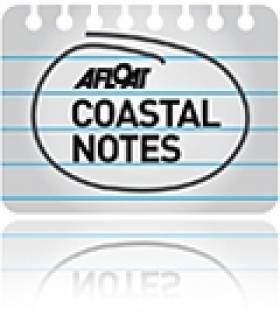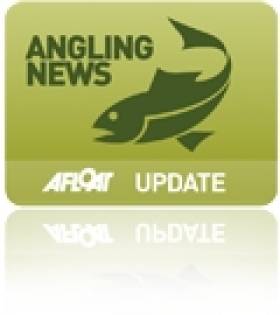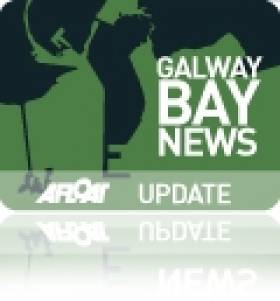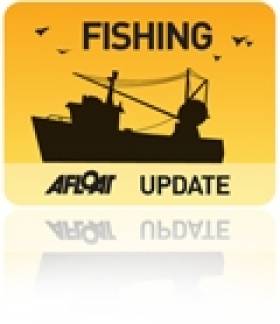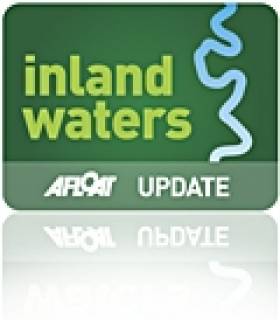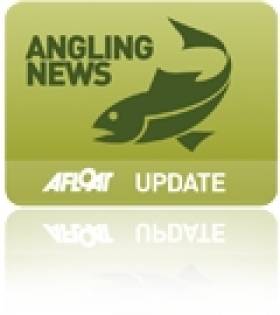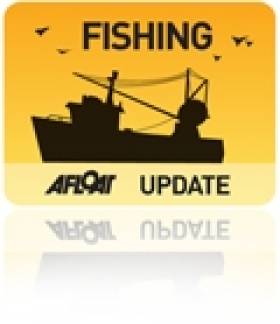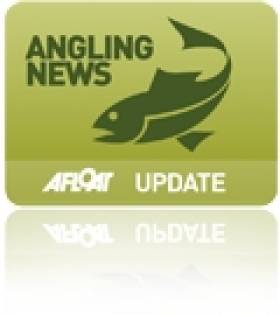Displaying items by tag: Minister for Natural Resources
Minister Welcomes Public Consultation on Fracking Research
#CoastalNotes - Minister for Natural Resources Fergus O’Dowd has welcomed the launch of a public consultation by the Environmental Protection Agency (EPA) on the proposed terms of reference for more detailed research to be carried out on the potential impacts of unconventional gas exploration and extraction on the environment, especially for inland and coastal fisheries.
Speaking last Friday, Minister O’Dowd said that he is particularly pleased that all interested parties, including individual members of the public, will have an opportunity to comment on the scope and objectives of this further research, thereby facilitating consideration of the broadest possible range of views.
Minister O’Dowd went on to say that “the detailed research to be commissioned by the EPA will build on other studies and research in this area and will inform future decision-making on any application that proposed the use of hydraulic fracturing in Ireland.”
Minister O’Dowd reiterated that until the EPA study has concluded and there has been time to consider its findings, the use of hydraulic fracturing in exploration drilling will not be authorised in Ireland.
Draft Net Season Won't Be Brought Forward Says Minister
#ANGLING - Minister for Natural Resources Fergus O’Dowd has confirmed that there is no proposal for the extension of the salmon draft netting season.
In response to concerns expressed by the angling community and highlighted by Derek Evans in The Irish Times last week, Minister O’Dowd emphasised that conservation and management of salmon and sea trout is key to protecting our valuable natural resources.
“Recent reports that the commercial season will be extended in certain rivers are untrue and I can confirm that for the 2012 season, the commercial fishing season remains as it was in all areas, with the River Suir still on a reduced season for snap fishing," said the minister.
"I am aware that confusion can arise due to the necessary extent of regulations in place. However, I am not considering any proposal for the extension of the commercial season."
The minister reminded that Inland Fisheries Ireland is the body that enforces Ireland's "extensive" fisheries legislation.
"IFI has offices throughout the country where advice can be sought. There is also a comprehensive and regularly updated website and information is also disseminated on Facebook and Twitter," he said.
Meanwhile, IFI chief executive Dr Ciaran Byrne said that the legislative code is regularly updated to ensure that Ireland's fisheries continue to be protected on the basis of information from IFI’s Standing Scientific Committee and IFI management advice.
“Only rivers with exploitable surpluses are open during the spring season and no fishery is open for commercial exploitation during this time," said Dr Byrne. "Fisheries that are classified catch-and-release or closed for salmon are now protected under bye-law 897 which prohibits the use of worms and the use of any fish hooks other than single barbless hooks.
"IFI’s priorities are maximising the return to Ireland, protecting sustainable jobs in isolated rural communities and promoting our wonderful angling resources," he added.
Management Plan for Galway Bay Fisheries On Track
#GALWAY BAY - Galway Bay FM reports that the National Parks and Wildlife Service is to work with the Marine Institute towards completing a management plan for Galway Bay.
It comes two weeks after a group of oyster fishermen met Minister for Natural Resources Pat Rabbitte at Leinster House to voice their concerns over a cap on oyster dredging licences.
As previously reported on Afloat.ie, local fishermen in the inner Galway Bay-Clarinbridge area are concerned that their livelihoods are at risk after the European Union ruled that there is over-intensification of fishing at the oyster bed.
Only 13 dredging licences have been issued this year, and EU Directives prevent their further issue until a fisheries management plan is introduced.
Galway West Senator Fidelma Healy-Eames says steps are being made to get the management plan on track.
Galway Oystermen Meet Minister Over Licence Cap
#FISHING - Fishermen from Galway met Minister for Natural Resources Pat Rabbitte at Leinster House yesterday to voice their concerns over a cap on oyster dredging licences, Galway Bay FM reports.
Local fishermen in the inner Galway Bay-Clarinbridge area are concerned that their livelihoods are at risk after the European Union ruled that there is over-intensification of fishing at the oyster bed.
Only 13 dredging licences have been issued this year, and EU Directives prevent their further issue until a fisheries management plan is introduced.
Minister Reaches Settlement Over Clondulane Weir
#INLAND WATERWAYS - Minister for Natural Resources Pat Rabbitte has announced that a settlement has been reached ahead of a court case over the removal of Clondulane Weir on the River Blackwater in Co Cork.
Lismore Realty Ltd and Lismore Trust Ltd has brought judicial review proceedings against the then minister over the department's direction in 2006 requiring the removal of the weird to allow for the free passage of migratory fish in line with national and European legislation.
The removal of the weir will now proceed folliwng the settlement, which terms that the parties will bear their own costs, and Lismore Realty Ltd and Lismore Trust Ltd will pay all reasonable costs of the removal of the weir, set to take place next summer.
Inland Fisheries Ireland will act as agents of the minister and manage the removal of the structure so as to minimise the impact on flora, fauna and habitat in the river, which is in a designated Special Area of Conservation.
First Meeting of National Inland Fisheries Forum
Seasonality, climate change and the environment were the hot topics discussed at the inaugural meeting of the National Inland Fisheries Forum in Athlone last Thursday.
Inland Fisheries Ireland chief executive Dr Ciaran Byrne hosted the forum, whose 60 voluntary members - drawn from various stakeholder groups - are is set to meet twice annually.
The day saw TV personality and keen angler Derek Davis installed as chairman of the forum, following his appointment by the Minister for Natural Resources.
Davis noted that the forum "can influence policies for the protection, management, development and conservation of this valuable resource now and for the generations to come."
In his own address to the forum, Dr Ciaran Byrne highlighted the members' collective experience in fisheries management on Ireland's inland waterways.
“A number of you have served as members of the central and regional fisheries boards, some for over 20 years," he said. "As members of the forum you have the opportunity to discuss and advise on the future of inland fisheries in Ireland. IFI looks forward to receiving your considered views on the various issues.”
In a message to the meeting, Minister Pat Rabbitte stated his belief "that the forum will provide a meaningful channel of communication between the stakeholders and management of the inland fisheries resource".
Fishing to be Reopened at Castlemaine Harbour
Minister for Natural Resources Pat Rabbitte has announced plans to reopen licensed commercial fishing in Castlemaine Harbour in Co Kerry, following the results of last year's pilot fishery.
“I am satisfied, based on scientific and fishery management advice... that it is safe to reopen this fishery under closely controlled conditions," said Minister Rabbitte. "The trial fishing conducted in the harbour last year establishes that this can be done without impinging on threatened stocks."
A statutory 30-day public consultation has now commenced on the required amendment to the Wild Salmon and Sea Trout Tagging Scheme 2011 to provide for the fishery's reopening.
"The consultation period will give those who disagree with that conclusion to put forward their views and I will pay close attention to what they say before reaching a final conclusion on the matter," the minister added.
Minister Rabbitte has also tasked Inland Fisheries Ireland with ensuring full enforcement of relevant quotas and conservation by-laws.
Bye-Laws for Wild Salmon Fisheries Approved
The Minister for Natural Resources, Conor Lenihan T.D., has approved a suite of regulations and bye-laws that will govern the wild salmon fishery in 2011. These will come into effect from Friday, 1 January 2011.
On receipt of management and scientific advice on the current status of Irish salmon stocks from Inland Fisheries Ireland and having considered submissions received through the public consultation exercise, the Minister of State introduced conservation measures for the management of the wild salmon and sea trout fishery in 2011.
Having signed the regulations and bye-laws the Minister remarked:
"I am cautiously optimistic about our native salmon stocks given the performance of stocks over recent years. The 2011 season will see 20 rivers which were closed in 2010 being opened because of an improvement in salmon stocks. 5 rivers which were previously closed for fishing, the Castletown, Suir, Glenamoy, Kerry Blackwater and Eske, will open with an identified surplus number of fish for harvest. 18 additional rivers will be open to angling on a "catch & release" basis."
"My caution is founded on the knowledge that 3 rivers which previously had been open will be closed on conservation grounds in 2011 (the Sheen, Screebe and Srahmore)", added the Natural Resources Minister.
In all the Standing Scientific Committee assessed 141 rivers and have advised that:-
· 52 rivers are open as a surplus of fish has been identified in these rivers (i.e. 2 more than in 2010);
· 29 rivers have been classified as open for "Catch and Release" only (i.e. 18 more than 2010 (see list below); and
· 60 rivers are closed as they have no surplus of fish available for harvest in them (i.e. 20 less than 2010).
The Minister also announced that in 2011 the cost of a one-day salmon angling licence (often used by tourist anglers) will be reduced by €12 (37.5%) on the recommendation of Inland Fisheries Ireland. "The purpose of the initiative is to give as much encouragement as possible to visiting tourist anglers to come to Ireland and experience the excellent game angling product being developed around our improving stocks" said Minister Lenihan.
With the exception of a proposed change to the number of blue (angling) tags applicable to a one-day salmon licence holder, the Wild Salmon and Sea trout Tagging Scheme Regulations for 2011 are in essence unchanged from the Regulations which were introduced following the establishment of Inland Fisheries Ireland in July, 2010. A number of minor amendments to the Regulations, recommended by Inland Fisheries Ireland, will provide for more effective administration of the tagging scheme regulations in 2011.
Summary of main changes to the management of the wild salmon fishery in 2011
19 Rivers which were closed in 2010 will open for angling on a "catch & release" basis in 2011:-
Ø Glyde (Dundalk fishery district)
Ø Slaney (Wexford fishery district) (note; river is closed until 12 May 2011)
Ø Bride (Lismore fishery district)
Ø Glengariff, Adrigole (Cork fishery district)
Ø Kealincha, Lough Fada, Behy, Owenascaul, Milltown, Feohanagh (Kerry fishery district)
Ø Grange (Sligo fishery district)
Ø Oily, Owenwee (Yellow River) (Ballyshannon fishery district)
Ø Bracky, Glenna, Tullaghobegley, Ray, Glenagannon (Letterkenny fishery district).
5 Rivers which were "catch & release" in 2010 and will open for harvest in 2011
Castletown (Dundalk fishery district)
Suir (Waterford fishery district)
Kerry Blackwater (Kerry fishery district)
Glenamoy (Bangor fishery district)
Eske (Ballyshannon fishery district)
3 Rivers which were open in 2010 will be limited to "catch & release" in 2011
Sheen (Kerry fishery district)
Screebe (Connemara fishery district)
Srahmore (Bangor fishery district).
8 Statutory instruments/Bye-Laws give effect to the decisions made by the Minister of State for management of the salmon fishery in 2011:
Wild Salmon and Sea Trout Tagging Scheme (No. 2) Regulations, 2010 provide for, among other things, the total allowable catch of fish that can be harvested by commercial fishing engines and rod and line from identified rivers.
Salmon Rod Ordinary Licences (Alteration of Licence Duties) Order 2010 and Special Tidal Waters (Special Local Licences) (Alteration of Duties) Order 2010: prescribe the licence fees payable from 1 January 2011.
Conservation of Salmon and Sea Trout (Catch and Release) Bye-law No. 873, 2010: specifies the rivers in which angling is permitted on a catch and release basis and associated conditions.
Conservation of Salmon and Sea Trout (Bag Limits) Bye-law No. 874, 2010: provides for the annual, season and daily bag limits for the 2011 season and also provides for fishing methods.
Conservation of Salmon and Sea Trout (Closed Rivers) Bye-law No. C.S. 306, 2010: prohibits angling for salmon and sea trout over 40cm in specified rivers.
The following bye-laws make provisions in relation to specific rivers:
Conservation of Salmon and Sea Trout (Newport River) Bye-law No. 875, 2010.
Conservation of Salmon and Sea Trout (River Bandon) Bye-Law No. 876, 2010.
Conservation of Salmon and Sea Trout (Garvogue River) Bye-Law No. 877, 2010
Public Consultation For New Salmon Fishing Rules
MINISTER for Natural Resources Conor Lenihan has opened a 30-day public consultation process on the Wild Salmon and Sea Trout Tagging Scheme Regulations for the 2011 season, The Irish Times reports.
Under the latest draft egulations, 51 rivers out of 141 will open for salmon fishing, with 30 classified as catch-and-release only. Sixty rivers will be closed, which is 20 fewer than the 2010 season, due to "an improvement in salmon stocks".
“Four previously closed, ie Castletown, Suir, Glenamoy and Eske, will open with an identified surplus for harvest,” said the Minister.
Some minor changes have also been recommended "to provide a more effective administration" of the tagging scheme for one-day salmon licences.
Public Consultation on the Wild Salmon and Sea Trout Tagging Scheme Regulations for 2011 Season
The Minister for Natural Resources, Conor Lenihan, has announced the start of a 30 day public consultation process on the Wild Salmon and Sea Trout Tagging Scheme Regulations for the 2011 season.
Regulations are made each year, after public consultation, for the management of the wild salmon and sea trout fishery, based on the scientific and management advice provided to the Minister by Inland Fisheries Ireland.
In launching the public consultation process the Minister remarked,
"The 2011 season will see 20 rivers which were closed in 2010 being opened because of an improvement in salmon stocks. Nineteen rivers will be open to angling on a 'catch & release' basis and 4 rivers which were previously closed, Castletown, Suir, Glenamoy and Eske will open with an identified surplus number of fish for harvest."
In all the Salmon Standing Scientific Committee assessed 141 rivers and have advised that:-
· 51 rivers are open (a surplus of fish has been identified in these rivers) i.e. 1 more than in 2010
· 30 rivers have been classified as open for "Catch and Release" only i.e. 19 more than 2010 (see list below) and
· 60 rivers are closed (no surplus of fish available for harvest) i.e. 20 less than 2010.
With the exception of a proposed change to the number of blue (angling) tags applicable to a one day salmon licence holder, the draft Tagging Scheme Regulations for 2011 are in essence unchanged from the Regulations which were introduced following the establishment of Inland Fisheries Ireland in July, 2010.
A number of minor amendments to the Regulations have also been recommended by Inland Fisheries Ireland, which will provide for more effective administration of the tagging scheme regulations in 2011.
Summary of main changes to the management of the wild salmon fishery in 201120 Rivers which were closed in 2010 will open for angling on a "catch & release" basis in 2011:-
Glyde (Dundalk fishery district)
Slaney (Wexford fishery district) (note; river is closed until 12 May 2011)
Bride (Lismore fishery district)
Glengariff, Adrigole (Cork fishery district)
Kealincha, Lough Fada, Blackwater, Behy, Owenascaul, Milltown, Feohanagh
(Kerry fishery district)
Grange (Sligo fishery district)
Oily, Owenwee (yellow river) (Ballyshannon fishery district|)
Bracky, Glenna, Tullaghobegley, Ray, Glenagannon (Letterkenny fishery district).
4 Rivers which were "catch & release" in 2010 and will open for harvest in 2011 Castletown (Dundalk fishery district)
Suir (Waterford fishery district)
Glenamoy (Bangor fishery district)
Eske (Ballyshannon fishery district).
3 Rivers which were open in 2010 will be limited to "catch & release" in 2011
Sheen (Kerry fishery district)
Screebe (Connemara fishery district)
Srahmore (Bangor fishery district).
The Minister is giving statutory notice of his intention to make the Wild Salmon and Sea Trout Tagging Scheme (No. 2) Regulations, 2010 to provide for the management of the wild salmon and sea trout fishery by Inland Fisheries Ireland in 2011 following the 30 day public consultation.
Any person may submit objections to the draft regulations at any time during the period of 30 days commencing on 20 November 2010 either in writing to the Department or by e-mail to [email protected]
Details of the conservation proposals for 2011 and the draft regulations are available on the Department's website http://www.dcenr.gov.ie/Natural/Inland+Fisheries+Division/Consultation+Process+Wild+Salmon+and+Sea+Trout+Tagging+Scheme+Regulations+for+2011+fishing+season.htm



























